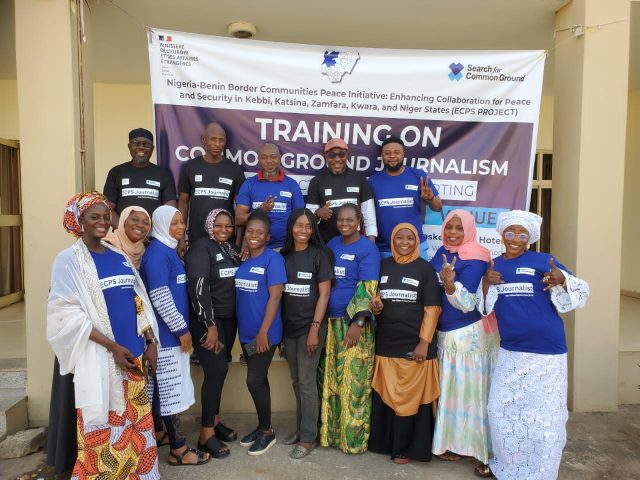By Ramat Ayo Ismail
An International Non-Governmental Organisation, Search for Common Ground has organized a -3 days workshop on conflict-sensitive reporting for media practitioners from Kwara and Niger States.
The workshop was aimed at changing the narrative of stories that generate tension and pose negative consequences for the conflict community.
The workshop which was held in Minna, Niger state, was to equip media personnel in corporate conflict sensitivity guidance into their reporting and build their capacity for responsible journalism.
Speaking on the sidelines of the training, the Media Specialist/ Media and Digital Peace building specialist, Mr Temisan Etietsola explained that media has a potential to shape the public opinion at the conflict zones.
He noted that journalists reporting in conflict areas should employ the system of “do no harm” journalism to ensure that they balance their report without supporting any parties in the crisis.
The facilitator stressed that the power of journalists in crisis communication is that it connects individuals and communities, evokes emotions, and also shapes perceptions about the crisis.
He stated that journalists covering conflict should conduct conflict sensitivity assessment to identify potential risks, assess the potential impact of their reports, and employed mitigation strategies to minimise the unintented negative consequences.
He stated that conflict sensitivity is essential for effective and humanitarian reporting, noting that it prevents conflict escalation but promotes peace.
According to the expert, journalists are bridge builders through their reports, so they should avoid use of any word that can portray them as taking side with one of the actors in the conflict.
He maintained that journalists need to identify the root cause of any crisis and involved relevant stakeholders that will promote peace in the area of conflict.
Expert pointed out that many crisis are escalated when media practitioners take sides either on religious or ethnic ground.
He added that common ground approach in reporting conflict-sensitive issues is key to de-escalating tension; as it places human beings over and above all forms of religion and belief.
Temisan however urged media practitioners to work as a connector not a divider in the conflict zone.
According to him, the project is 15 month projects targeted at training journalists to promote peace and security in Nigeria — Benin boarders communities.
Earlier in her opening remark, the SEARCH Project Manager, Remikat Ayuba explained that organization is an international non profit organization that promotes peaceful resolution of conflict with their headquarters in Washington DC and European office in Brussel.
She said the project is tagged Nigeria — Benin border communities peace initiative, aimed at enhancing collaboration for peace and security in Kebbi, Kastina, Zamfara, Kwara and Niger states.
Speaking on the project objectives, Remikat said the project was aimed at strengthening the capacity of media personnel for peace and security reportage.
“To enhance security coordination and collaboration between communities and security agencies and also to improve intra and inter — communal perceptions of peace and security.
Remikat therefore, called on the participants to participate actively at the training for them to be well equipped as peace building journalists.








